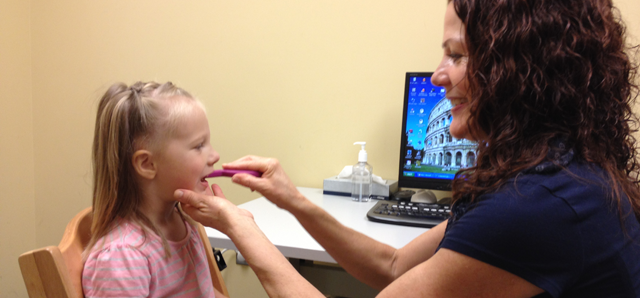When Should You See a Speech Pathologist for Language Disorders?
When Should You See a Speech Pathologist for Language Disorders?
Blog Article
Just How a Speech Pathologist Can Aid Improve Interaction Abilities
Efficient communication is a keystone of expert and personal success, yet lots of individuals encounter difficulties that prevent their capability to reveal themselves clearly. A speech pathologist is outfitted to deal with these obstacles with targeted analysis and intervention approaches tailored to each person's demands.
Comprehending Interaction Conditions
Recognizing communication problems is vital for recognizing exactly how they affect individuals' capability to share themselves and engage with others. Interaction problems encompass a vast array of problems that influence speech, language, and social communication, usually impeding effective interaction. These conditions can arise from various variables, including neurological conditions, developmental hold-ups, physical impairments, or mental problems.
Speech problems may materialize as troubles in articulation, voice, or fluency manufacturing, affecting just how words are pronounced or spoken. Language disorders, on the other hand, include challenges in understanding or making use of language, which can restrain both non-verbal and spoken interaction. Social interaction problems are identified by difficulties in the pragmatic aspects of communication, such as taking turns in discussion or understanding social signs.
The effects of interaction problems are extensive, impacting not just the person's capacity to share thoughts and emotions but also their social relationships, educational opportunities, and overall high quality of life. Recognition of these problems can promote empathy and support, encouraging effective strategies for interaction and involvement. Comprehending the intricacies of communication disorders is a vital action towards advertising inclusivity and addressing the requirements of those impacted.
Duty of a Speech Pathologist
Speech pathologists regularly play a vital role in treating and identifying communication conditions, employing a variety of evidence-based methods tailored to each person's requirements. These experts collaborate with individuals throughout the life expectancy, from children with speech hold-ups to adults recouping from strokes or stressful mind injuries. Their knowledge incorporates a variety of communication concerns, including expression, fluency, language, and voice conditions.
In healing setups, speech pathologists make use of structured interventions created to enhance interaction skills. They may carry out methods such as speech workouts, language games, and social interaction training to facilitate improvements in meaningful and responsive language capabilities. Speech Pathologist. In addition, they educate customers and their households regarding efficient communication methods and flexible methods to navigate day-to-day interactions
Beyond straight therapy, speech pathologists collaborate with various other health care instructors, caregivers, and specialists to guarantee a thorough technique to therapy. They support for clients by providing resources and assistance, enabling people to attain their communication goals and improve their general top quality of life. As specialists in the field, speech pathologists are vital in cultivating effective interaction, promoting independence, and improving social engagement for those with interaction obstacles.
Assessment and Diagnosis Process
The analysis and medical diagnosis procedure performed by speech pathologists typically involves an extensive evaluation to identify communication conditions precisely. This procedure begins with an in-depth medical history, where the clinician collects pertinent details concerning the person's medical, academic, and developmental history. Comprehending the context of the individual's communication troubles is essential for a precise diagnosis.
Following the instance history, speech pathologists utilize casual assessments and standardized examinations to assess various elements of communication, consisting of speech noise production, language understanding, expressive language, and social communication skills. These assessments are tailored to the person's age and particular concerns, giving useful information for analysis.
Observation is likewise a critical part of the evaluation procedure, as it allows the medical professional to see firsthand exactly how the individual interacts in natural setups. In addition, interviews with household members and educators can offer understanding into the person's interaction difficulties throughout various atmospheres.
Once the evaluation is total, the speech pathologist manufactures the findings to figure out a diagnosis and recommend proper treatments. This extensive analysis process makes sure that people receive targeted assistance customized to their distinct interaction demands, laying the foundation for efficient healing approaches.
Healing Methods and Approaches
Countless restorative strategies and methods are used by speech pathologists to address a variety of communication conditions efficiently. One extensively used approach is expression treatment, which focuses on link fixing speech seems with rep and visual cues. This method is specifically beneficial for people with speech audio disorders.
One more reliable approach is language treatment, which improves both meaningful and responsive language abilities. This may involve interactive activities that promote vocabulary development, sentence framework understanding, and conversational abilities. Furthermore, speech pathologists frequently use social skills training to improve practical language capacities, allowing people to browse social communications a lot more effectively.
Fluency shaping and stuttering adjustment methods are specifically developed to assist those experiencing fluency disorders. These strategies aid clients establish smoother speech patterns and manage the physical and emotional parts of stuttering.
Furthermore, alternative and augmentative communication (AAC) systems are used for people with severe interaction problems. These systems, which can include gestures, icons, or electronic devices, offer necessary support for effective interaction.
Benefits of Speech Treatment

Additionally, speech treatment can aid in establishing essential listening and understanding skills, fostering far better interaction in conversations. People with cognitive-communication conditions can likewise benefit, as therapy focuses on reinforcing memory and analytic abilities, important for reliable communication.
One more crucial facet is the psychological support supplied during treatment sessions. Speech pathologists produce a risk-free atmosphere, encouraging individuals to get rid of anxiety and frustration pertaining to their communication problems. This support can lead to improved self-esteem and general psychological health.
Furthermore, early treatment via speech therapy can stop more complications, making certain that people reach their complete communicative capacity. On the whole, the advantages of speech therapy prolong beyond simple speech improvement, favorably influencing different measurements of life for those impacted by communication difficulties.
Conclusion
In summary, speech pathologists play an essential duty in attending to communication conditions with evaluation, diagnosis, and tailored healing interventions. By utilizing evidence-based methods, these experts improve individuals' speech and language capacities, fostering improved quality, fluency, and social interaction abilities. The advantages of very early treatment emphasize the significance of seeking assistance from speech pathologists, as their competence can significantly improve communicative Read More Here potential, ultimately bring about better success in both specialist and personal spheres.

Speech pathologists frequently play an essential role in identifying and treating communication problems, employing a range of evidence-based strategies tailored to each individual's requirements. As experts in the area, speech pathologists are necessary in cultivating efficient communication, advertising freedom, and enhancing social participation for those with interaction challenges.

Report this page